- Home
- Laura Anne Gilman
Staying Dead Page 9
Staying Dead Read online
Page 9
The man standing next to her coughed on his sparkling wine, and Sergei shook his head in mock dismay. “Don’t even think about it, Valere. If you’re a good girl, maybe I’ll introduce you to the artist and you can haggle out a deal of your own. I won’t even take my commission.”
“Deal.” Not that she could afford it, even without his cut, but it was a pleasant dream.
“Damn.” Sergei was looking over her shoulder, his gaze caught on something clearly displeasing. She shifted so that she could follow without being too obvious about it. Nothing seemed out of place…oh. There, by the bar set up in the back to serve preferences stronger than champagne.
“You’ll excuse me?”
“I’m not a client, Didier. Go, shoo.”
He gave her a distracted smile and moved through the crowd like a Coast Guard cutter. Poor Lowell—and when was the last time you thought of him that way?—was clearly overmatched by the statuesque woman in a black silk pantsuit who was insisting to the bartender that she wanted another drink.
“Honey, you’ve had two too many at least,” Wren said to herself as Sergei intercepted the woman with a firm hand under her elbow. They knew each other, from body language. But not a date; he hadn’t been serious about anyone since whatshername last summer, and even if Sergei were to bring a casual date to an opening he was hosting—damned unlikely—she would be someone helpful, not a disaster waiting to happen. Not that she was keeping track of his dating habits. Much.
She watched a moment longer as her partner turned the charm on full-assault, then went back to admiring the sculptor’s work. Maybe not all abstract work was crap, after all….
“You told me that it was perfectly safe. You said that the spell-casting done on it was inert, that the magic inside it couldn’t escape. Ever.”
The woman seated in front of the desk wanted desperately to backhand this sniveling little weasel, but held onto her temper by a bare margin. Slapping clients around was very bad for business, no matter how good it felt personally.
The speaker went on, fleshy pink lips moving in his narrow, sallow face, and that horrible whine coming from his throat, but she tuned it out.
Instead, she looked at her reflection in the glassed-in cabinet behind the client, making sure that no sign of her irritation marred her face. That face could have belonged to a woman anywhere from forty to fifty; brown skin only showing faint lines around lips and eyes, a strong nose and large brown eyes, thick black hair cut short and straight. Never a face to redefine beauty, it nonetheless inspired confidence and a certain sense of security in those she worked with. As it was meant to.
Even the ones who were idiots. Perhaps especially the ones who were idiots.
They were seated in the client’s office, a lovely room on the first floor of the mansion they always met in. She assumed it was his home, but had never seen any more of the structure to judge. They always met here: she was willing to negotiate long-distance, but that wasn’t satisfactory to this moron. He wanted face-to-face on every damned little detail.
She felt her irritation rising again, and tamped it down, making herself look as though she was paying attention to whatever he was saying. It had been a long day, but that was no excuse. You could also tell a great deal about a client by how they did business. Some insisted on meeting on third-party ground, somewhere impartial. Some never wanted to meet face-to-face, preferring to keep it as distanced as possible. And some—like this fool—kept it close to home, as though that gave them an illusion of control.
It would have been a better illusion if he hadn’t called at seven in the morning, bleating like a stuck lamb, demanding that she come out immediately. Whining that the object he had gone to such great lengths—and expense—to acquire gave him, and she quoted, “the creeps.” As though the fact that he was her primary client earned him some first claim—more than that, some sole claim over her time.
It did, actually. You jumped when the main bill-payer barked. But most had the grace to acknowledge that her skills were worth the courtesy of asking, not demanding, her presence. And “the creeps—” Good Lord, what did the man want? He knew ahead of time the object had magical influences; she had told him herself, once she’d been given the target. He had assured her that he was prepared, had taken the appropriate safeguards.
Arrogant bastard. Even terrified, especially terrified, he was still a shit. Still, you had to make exceptions for wealth and eccentricity, especially when they came together in the same package. And so she had rescheduled everything else that day and, despite the eight-hour drive, come out to hold his hand. Metaphorically. He wasn’t paying her that much.
So now, for the third time in an hour, she tried to inject a note of reassuring confidence into her voice. “We’ve been over this how many times? That particular spell was woven into the stone at the time of its formation. It is integral to the object, and cannot be removed.” It was the object, in all the ways that mattered. Without the spell, the item was just a block of stone, mass produced and totally without value. “Unless you intend actual harm to the owner of the building it was taken from, it cannot harm you in turn. We went over this before the initial approach and I warned you of all the possible consequences. I am assuming you still have no plans to harm that person?” Not that she would otherwise care—she knew whose building she had targeted; let the two take each other out and the world would be a cleaner place—but, again, bad business.
“I want you to check it out,” the client told her, ignoring her question as though she hadn’t even spoken. “Make sure nothing went wrong in the transport.”
“That wasn’t in our original contract,” she told him, leaning backward in preparation for a prolonged bargaining session. But instead, he reached into the desk drawer and pulled out a small brown paper-wrapped packet. He placed it on the desk surface, and pushed it across to her. Her eyes never leaving his, she reached forward and picked it up.
“Half the amount of our original fee, simply for ensuring that the magic within the stone remains inert.”
She gauged the weight of the packet, then nodded, tucking it into a pocket of translocation energy she used instead of a pocketbook. It took more maintenance than the convenience was worth, but it impressed the clients when you made things seemingly disappear into thin air. Anything sent there ended up in a safe in her own home, actually. She had been taken advantage of—read that as robbed by her own client—early in her career. Never again.
“All right. Let’s get this over with.” It was already evening, and there was no way she was going to stay overnight in the place, even assuming he would offer. She stood, waiting for him to lead her to wherever he had stored the object, but he reached into his desk again, and came up with a length of black cloth.
“You can’t be serious—” But she could see from his expression that he was. Deadly serious.
More control games. It didn’t matter—any half-trained mageling could retrace their own steps, blindfolded, drunk and half-asleep. But if it made him happy…
She submitted to the blindfold, but couldn’t help a shudder when the client took her arm to lead her out of the office. Now she knew why she had always resisted touching him. Her clients rarely came to her pure of heart or deed, but this man exuded some of the slimier emotions—avarice chief among them—so strongly that it was almost a tactile sensation. And underlying it all was a distasteful sense of something dark and ugly, like sludge in a sewer pipe, that made her deeply uncomfortable. Her client, she realized suddenly and for the first time, wasn’t what most psychologists would call stable. But freelancers couldn’t be choosers. Especially at these pay levels.
He led her down a hallway that echoed their footsteps off the hardwood flooring, then into an elevator that muted their steps with plush carpeting. There was a faint odor in the air which hadn’t been there before—orange? No, but definitely citrusy. Something familiar…wood oil. The walls of the elevator were wood, and had been polished recently. God, it was good to have money, wasn�
��t it? She doubted very much he had ever touched a dust rag in his entire life.
They rose one story, then got off and walked down another length of hallway, this time carpeted. The smell of the oil faded under the onslaught of a colder smell—recirculated air. They were in a part of the house that was sealed off from the outdoors. His collection rooms. She had known that he liked to own things—rare things—he shouldn’t; had in fact gotten him some of them herself, but not the sheer number he possessed, to require this much space. As they walked, she could feel things tugging at her, faint sparkling touches as appealing as the client was distasteful, and she felt a moment of honest astonishment when she realized their source. Some people collected antique glass, or Impressionist paintings or Pez dispensers. In addition to everything else, the client collected Artifacts.
No wonder he had assured her that he had the proper containment facilities for the cornerstone! But if so, why…and what damage was being done, putting them all in together, where their current might scrape and rub against each other…Was that why the cornerstone was behaving oddly?
Not her business. Not her problem. Do the job and get the hell out, she told herself. And maybe, money or no, you don’t take any more magic-related jobs for this particular individual, who was clearly crazier than a wizzart on acid.
Finally he stopped, letting go of her arm long enough to open a door, then he ushered her inside and removed the blindfold. Her attention was snagged immediately by the large crystal to one side of the room that hummed with stored energies. Artifacts. Icons. Almost anything could hold current, but an object made expressly for that purpose, imbued with the creator’s own ability…like a Christian cross repelling a vampire, the emotional intent of the object intensified its effect.
Gods above and below, she thought wildly, fighting her body’s instinctive urge to flee. Too much. Too much power. It would consume her, overwhelm her. She tamped down on the panic as best she could, concentrating on breathing, building up her own defenses until the chaotic current-flows dulled to a distant roar.
A not-so-gentle cough from the client reminded her of why she was there, and the woman forced her gaze away from the seemingly endless planes and angles of the crystal and back to the job at hand.
Mage-sight wasn’t one of her strengths, but she had enough to get the job done. Settling herself into a light trance state, careful to work over her defenses rather than through them, she blinked, then looked at the plain gray slab of marble sitting by itself in a corner. Part of her mind found it ludicrous that such an ugly piece of nothing was treated as though it were a piece of artwork, but the majority of her awareness Saw the glitter of magic that permeated the concrete, and knew its value.
It looked exactly the same as it had when she worked the original spell to remove it; red in the middle, where the original activation spell still roiled about, then blue surrounding it, and a paler green on the surface, where the retaining spell was weakest, shining through the concrete plug. Sloppy work there: she would have reinforced it with something a little less porous herself, if she had been the caster. But it was intact.
She was about to break out of trance state and tell the client that he was safe as houses when there was a flicker of light to one side. Frowning, she walked over to get a better line of sight on it. A crooked line of gold ran zigzag through the green, like a Navajo sand painting she’d seen once on display in one of those little art galleries scattered throughout the city.
“Well, well, what do we have here?” she wondered, reaching out with one finger to test it. Even as that one part of her brain told her that was an incredibly stupid thing, she made contact.
A sting of lightning ran through the nerve endings of her arm, straight into her brain. She convulsed once, like a bad sneeze, and a wave of vertigo shivered through her. Then it was gone, and she was standing in front of a perfectly quiescent spellblock, red and blue and green exactly in order.
“What happened? Did it do anything? What’s wrong?” The client sounded like a rabbit, and the thought made her smile. The power still whispered through her, attempting seduction. It would be so easy to turn on him, take what was here and disappear…And then never work again, the practical portion of her brain reminded her. The Council already has its eye on you. Not smart.
Blinking out of trance state, she turned to look at the client. “There was a slight disturbance,” she told him blithely. “But I corrected it. Everything should be fine now.”
The client didn’t look completely convinced, but whatever she had done had apparently chased away the creeps, because he nodded, and offered her the blindfold again. She took it without hesitation, tying it around her own eyes. The less she saw, the better. She wouldn’t give him any reason to turn that craziness on her.
The door closed behind them, and the room settled into silence once again. But deep inside the stone, the red spell energy was suddenly shot through by gold streaks of lightning. The red solidified, pulsing in a fashion unlike its earlier roil, and then stilled completely.
And a mage of moderate ability, listening intently, would have been able to hear a scream of rage and despair rise from the interior of the concrete block.
seven
Sergei looked at his watch, tilting his wrist slightly to catch the light. 10:58 a.m. He was exactly, perfectly on time. He could feel the slight pressure in the soles of his feet that indicated the elevator was moving him upward at a disconcertingly quick speed. It made him, he admitted, nervous. He was all for speed, and power, but he much preferred being the one determining how it was used.
Not that he didn’t trust the Mage Council. He did. He trusted them to be cold, calculating, utterly ruthless and completely without a shred of human decency. Perfectly reasonable businessmen. Which was why he was here, in this elevator, instead of his partner. He could hold his own in negotiations, smooth-talk his way through the landmines and hopefully get out with what they needed, not having left too much of himself behind.
Sergei Didier knew from long experience that you didn’t need Talent to deal with the mages. Only patience, and a great deal of self-control. His Wren, for all that she was exceedingly good at what she did, lacked a certain level of self-possession when it came to negotiations.
In short, she lost her temper. And everything always, but always, went downhill from there. That was why he was making this call, and not her. Normally, a non-Talent like himself wouldn’t be allowed inside the building. The fact that they had allowed him entrance meant that they accepted him as Wren’s surrogate. Unusual, but not unheard of.
The Council’s old-fashioned, very 1950s patriarchal, except the role of the guy is played by the Talent, and all their dependents, nonmagically, are the wimminfolk and children, used for display to show you’re a good provider, if they’re allowed in sight at all. Her disgust when she said this had been unmistakable. He hadn’t realized, before the two of them started working together, how deep the distaste between lonejack and Council went. Fair enough, since he’d only ever heard rumors of the Council’s existence before they hooked up. But they were still all Cosa and therefore protected by the rules of the game, such as it was. Because of that, he was perfectly safe here as Wren’s surrogate. So long as he didn’t do or say or start anything stupid.
He shot the cuffs of his suit, straightening his shoulders so that the suit jacket fell smoothly, the way his tailor had designed it. The finely cut wool slid against the ironed cotton of his shirt, and when he looked down, the cuffs of his pants broke exactly right over his polished dress shoes. Clothes might not make the man, the way his father had always insisted, but they did make the man feel more confident. He was going to ace this. Keep it cool, keep it easy, and keep it under control. Don’t let Wren down.
The elevator slowed, and then came to a stop. The doors slid open smoothly, without a ding or beep to indicate he had arrived. There were no floor indicators inside the darkly paneled box, no call boxes or emergency phone. You got in because you wer
e here to see the Council, and you got to the floor you needed to reach because they wanted to see you.
A solemn young man, carefully groomed and expensively dressed in a subtle gray suit and cream-and-gray herringbone tie, waited to greet him in the equally dark-paneled, gray-carpeted empty space that would have been the reception area in an ordinary office. They looked like nothing so much as two proper high-risk investment bankers, junior and senior, plotting a merger. Or world domination.
“Mr. Didier. Follow me, if you would.”
He was led down a hallway that, like the young man, whispered of power and wealth. The young man could be dismissed. But Sergei believed in those other whispers. The gathered power of seven generations of mages had built the place, and they maintained it to this day. The young man was nothing, merely one cog in the workings of a greater whole. This building embodied the whole.
You’re letting your imagination get the better of you, part of his mind tried to tell him. But the rest of him knew the sensation to be true. These were the real halls of power. And Power.
His guide opened a door, standing to one side in order to usher him into a conference room, then shut the door behind him. “Nice to have met you, too,” he said to the door, unable to resist. Sarcasm wouldn’t be helpful here. But it made him feel better. Had he been like that before Wren? Or did she merely bring it out in him? And why was he chasing that thought now? Impossible questions. Mind on the job, Sergei!
Turning, he took an almost unnoticeable breath, girding himself for battle. The room was not empty. Four people waited for him in the lushly-appointed space; three men, two elderly, one middle-aged, all wearing variations on the young man’s grayness. And a woman, white-haired and serene, wearing a deep-blue suit with a large opal pin on the lapel. Sergei recognized the woman at once—KimAnn Howe. She had married a wealthy businessman back in 1968, and therefore been photographed many times in the social papers, keeping her hand in even after the businessman died. She had won herself a seat on the Mage Council fair and square, he recalled, through a combination of ruthless Talent and even more ruthless backstabbing. Petite, but with an air of strength, and graceful, even seated; she was a woman you’d be proud to bring home to Mother, if Mother was a black widow spider.

 West Winds' Fool and Other Stories of the Devil's West
West Winds' Fool and Other Stories of the Devil's West Gabriel's Road
Gabriel's Road Morgain's Revenge
Morgain's Revenge The Shattered Vine
The Shattered Vine Laura Anne Gilman - Tales of the Cosa Nostradamus
Laura Anne Gilman - Tales of the Cosa Nostradamus The Camelot Spell
The Camelot Spell VISITORS
VISITORS Staying Dead
Staying Dead Silver on the Road
Silver on the Road Weight of Stone
Weight of Stone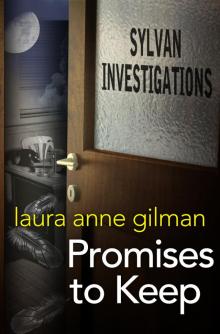 Promises to Keep
Promises to Keep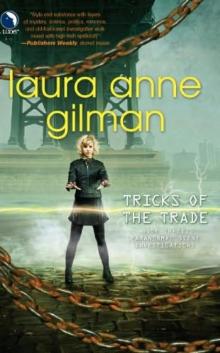 Tricks of the Trade psi-3
Tricks of the Trade psi-3 Blood from Stone
Blood from Stone Soul of Fire tp-2
Soul of Fire tp-2![Pack of Lies [2] Read online](http://i1.bookreadfree.com/i1/04/01/pack_of_lies_2_preview.jpg) Pack of Lies [2]
Pack of Lies [2] Burning Bridges
Burning Bridges The Work of Hunters
The Work of Hunters Miles to Go
Miles to Go Pack of Lies psi-2
Pack of Lies psi-2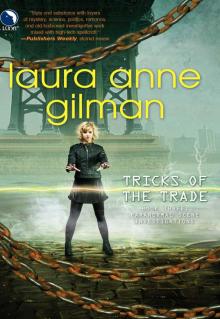 Tricks of the Trade
Tricks of the Trade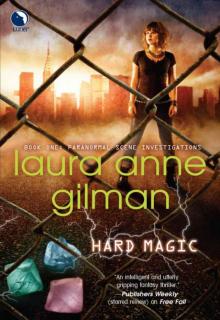 Hard Magic
Hard Magic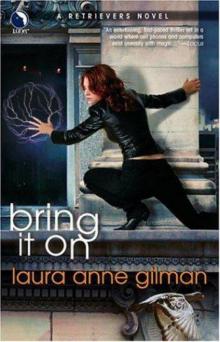 Bring It On
Bring It On Darkly Human
Darkly Human The Cold Eye
The Cold Eye An Interrupted Cry
An Interrupted Cry Soul of Fire
Soul of Fire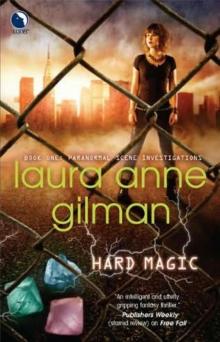 Hard Magic psi-1
Hard Magic psi-1 The Shadow Companion
The Shadow Companion Flesh and Fire
Flesh and Fire